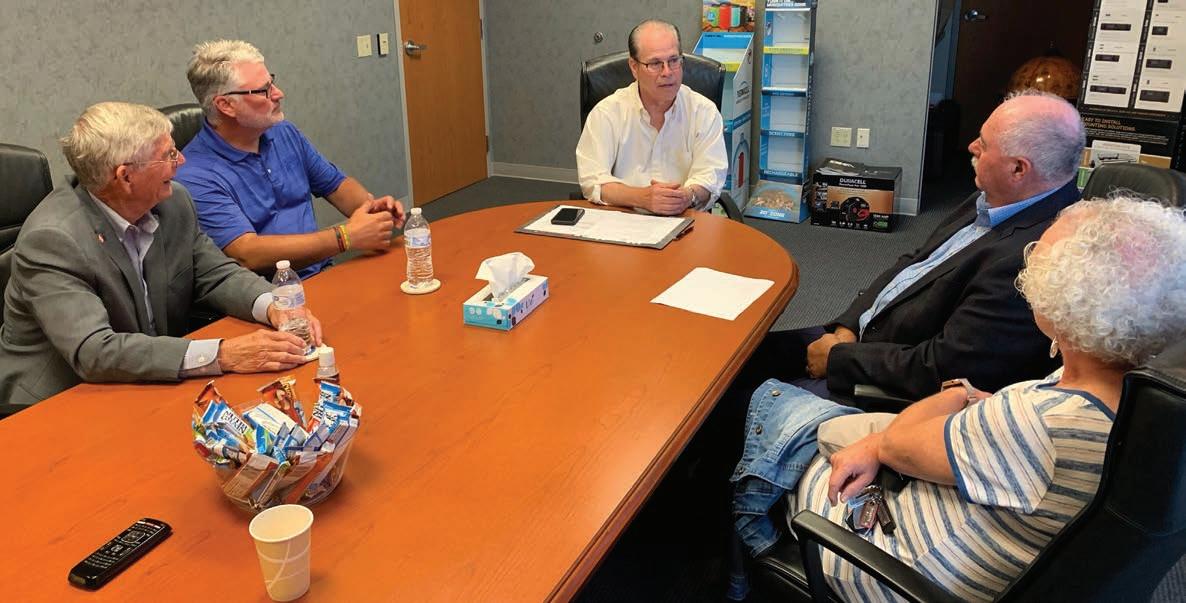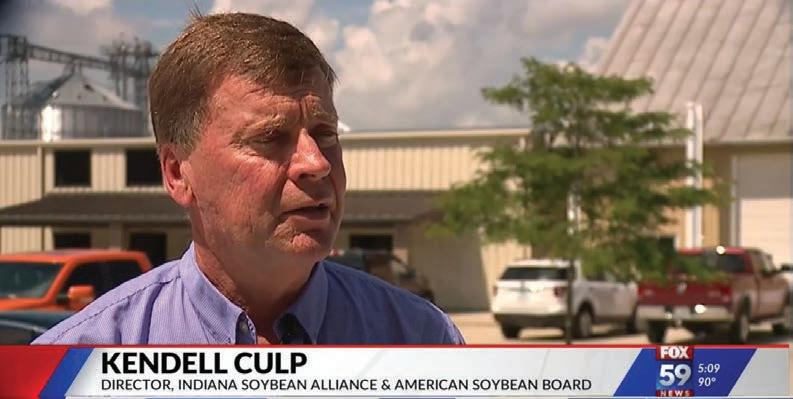
4 minute read
ISA, ICGA tout U.S. Senate’s approval of Growing Climate Solutions Act
from Indiana Corn and Soybean Post - Summer 2021
by Indiana Soybean Alliance & Indiana Corn Marketing Council
Sen. Mike Braun, center, discusses his Growing Climate Solutions Act in a meeting with ICGA President Mike Beard, far left, ISA Board member Craig Williams, left, and ICGA Board member Mike Nichols and his wife, Debra. Sen. Braun’s legislation was approved in the Senate by a 92-8 vote on June 24. The House will now consider the proposal.
BY DAVE BLOWER JR.
The Growing Climate Solutions Act received overwhelming approval with a 92-8 vote on the floor of the U.S. Senate on June 24. Also known as Senate Bill 1251 and sponsored by Sen. Mike Braun (R-Ind.) and Sen. Debbie Stabenow (D-Mich.), the proposal creates a certification program at USDA to help eliminate entry barriers to farmer and landowner participation in carbon credit markets. Earlier this month, Braun spoke with Indiana Soybean Alliance (ISA) and Indiana Corn Growers Association (ICGA) members about the benefits of his proposal.
“Market demand for carbon credits represents a significant opportunity for Indiana farmers to improve their annual income,” said Mike Beard, a Frankfort, Ind., farmer and ICGA president, who attended that meeting with Sen. Braun. “We are very happy with the Senate’s support of this bill, and we encourage the U.S. House of Representatives to take up the issue quickly and help farmers across the country.”
House Ag Committee members Rep. Abigail Spanberger (D-Va.) and Don Bacon (R-Neb.) have introduced a companion bill that eventually will be combined with the Growing Climate Solutions Act.
“Farmers have always led the way on protecting our environment, and the Growing Climate Solutions Act helps them get paid for their sustainable practices through voluntary carbon credit markets,” Sen. Braun said. “Hoosiers and Americans want real-world solutions, and Growing Climate Solutions is a bipartisan, common-sense, pro-jobs win that farmers, industry leaders, and conservationists can all support – all without growing our government or our deficit.”
According to Braun’s bill, the new USDA program would offer reliable information about carbon markets and access to qualified technical assistance providers for farmers and landowners. This bill establishes a Greenhouse Gas Technical Assistance Provider and Third-Party Verifier Certification Program in the USDA to provide transparency, legitimacy and informal endorsement of third-party verifiers and technical service providers that help farmers and private landowners generate carbon credits through a variety of agriculture and forestry-related practices. The USDA certification program will ensure these assistance providers have agriculture and forestry expertise, which is lacking in the current marketplace.
Sen. Stabenow, who is the Chair of the U.S. Senate Committee on Agriculture, Nutrition and Forestry, said passage of the Growing Climate Solutions Act will improve the environment by encouraging more farmers and landowners to enter the carbon credit markets.
“Addressing the climate crisis is one of the most urgent challenges we face and our farmers and foresters are an important part of the solution,” Stabenow said. “The bipartisan Growing Climate Solutions Act is a win-win for farmers, our economy and for our environment. Our bill is a perfect example of how we can work across the aisle and find common ground to address a critical issue affecting all of us and our future.”
USDA will administer a new website, which will serve as a “one-stop shop” of information and resources for producers and foresters who are interested in participating in carbon markets. Through the program, USDA will help connect landowners to private sector actors who can assist the landowners in implementing the protocols and monetizing the climate value of their sustainable practices.
“Gaining access to carbon markets is often confusing and difficult,” said Mike Koehne, a Greensburg, Ind., farmer and chair of the ISA’s Membership and Policy Committee. “This legislation should make it easier for farmers and landowners to participate and benefit from meeting market-based demands for carbon credits.”
Sen. Braun first proposed the Growing Climate Solutions Act more than a year ago. In a series of meetings with Hoosier farmers and agricultural leaders, the proposal has been modified to its present form.
“Sen. Braun has worked with the Indiana Soybean Alliance and Hoosier farmers to make sure that the Growing Climate Solutions Act is agriculture friendly,” said Phil Ramsey, a Shelbyville, Ind. farmer and American Soybean Association Board member. “This proposed law will help farmers as they start to engage in carbon markets and implement more environmentally friendly practices.”
More than 175 organizations, including many farm groups, supported the Growing Climate Solutions Act.
“Farmers at their core are businesspeople, but they are also conservationists, and they are also environmentalists,” said Lafayette, Ind., farmer Brent Bible. “Farmers want to do the right thing for their farms, their ranches, so that they can sustain those operations, not just over their lifetime, but over generations. This Act gives us the opportunity to do those things and have some guidance and direction in what practices are good for the environment, and there is an economic benefit for doing those particular things.”

Rensselaer, Ind., farmer Kendell Culp, who is also an American Soybean Association Board member and ISA Board member, is interviewed by an Indianapolis television station on his support of Sen. Mike Braun’s Growing Climate Solutions Act.










